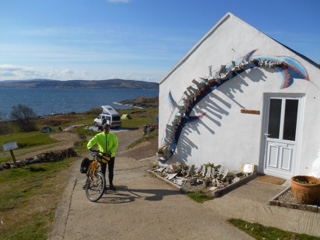When we were In Wales in early March the Youth Hostels we passed were still shut, so we took refuge in Bed & Breakfasts. The well made and signposted Coastal Footpath around Wales is quite busy with walkers and so there were no shortage of lovely places to stay. They are very diverse and of a high quality - we have stayed in B&Bs that were in a lighthouse, in a whiskey barrel, as well as the more usual farms and houses. In some places you are included in the daily goings on of the family, but in most you are given a key to your room and the front door and you can come and go as you please. My eyes have been opened to the usefulness of B&Bs, you can stay for just 1 or 2 days, they are located everywhere- even in remote areas, and they are pretty good value, especially when you have a full cooked breakfast.
As we travelled North along the coast through Scotland there were more independent hostels. These are excellent places to stay - they often provide rooms for 2 or 4 people, many are ensuite and the rooms are set up for people who have rucksacks or panniers and just need spaces to hang a few clothes without needing the rooms to be overly decorated. We have stayed in hostels whenever we can and have rarely needed to share our room. The other great advantage of hostels is that they have well resourced kitchens - this means we can buy food and cook for ourselves - useful when you are on a budget.
In the far North of Scotland and remote areas many of the established hotels have opened basic bunkhouses which consist of a room full of beds or bunks with shared showers and toilets. Most actually provided bedding and duvets, but in a few we have needed our sleeping bags. Bunkhouses usually have a kettle and tea/coffee but not kitchens. However, as they are attached to hotels you can always eat in the bar of the hotel.
Some campsites have also had buildings to rent if the weather is bad - these have had kitchens and are like little apartments.
We have also stayed in rooms in pubs.
Our bikes have been well looked after too having slept mainly undercover. They have been in pub cellars, B&B dining rooms, in bike sheds and garages, on the ground floor of a lighthouse, in a sticks of rock shop, in a haunted dungeon in a castle, and once were put in a bedroom in a hotel! They have occasionally had to rough it outside but my saddle has a shower cap to keep its saddle dry when it rains!









